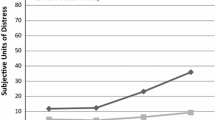Abstract
An earlier empirical investigation found the interaction of negative-feedback seeking and roommate rejection to be predictive of increases in depressive symptoms. This study replicated and elaborated this finding. Participants who sought negative feedback and performed below their personal standard of success were more likely to experience a subsequent increase in depressive symptoms compared with all other students. Furthermore, the interaction of negative-feedback seeking and midterm failure was specific to predicting increases indepressive symptoms, and did not predict anxious symptoms, thus supporting the specificity of the model to depression. These findings suggest that negative-feedback seeking, combined with a negative life event, may place an individual at increased risk for depressive symptoms. Potential methods and consequences of disrupting the pattern of negative-feedback seeking are discussed.
Similar content being viewed by others
REFERENCES
Beck, A. T., Epstein, N., Brown, G., & Steer, R. (1988). An inventory for measuring clinical anxiety: Psychometric properties. Journal of Consulting and Clinical Psychology, 56, 893–897.
Beck, A. T., Rush, A. J., Shaw, B., & Emery,G. (1979). Cognitive therapy of depression. New York: Guilford.
Beck, A. T., & Steer, R. A. (1987). Manual for the revised Beck Depression Inventory. San Antonio: Psychological Corporation.
Beck, A. T., Steer, R. A., & Garbin, M. G. (1988). Psychometric properties of the Beck Depression Inventory: Twenty-five years of evaluation. Clinical Psychology Review, 8, 77–100.
Brown, G. P., Hammen, C. L., Craske, M. G., & Wickens, T. D. (1995). Dimensions of dysfunctional attitudes as vulnerabilities to depressive symptoms. Journal of Abnormal Psychology, 104, 431–435.
Cohen, J., & Cohen, P. (1983). Applied multiple regression/correlation analysis for the behavioral sciences (2nd ed.). Hillsdale, NJ: Erlbaum.
Giesler, R. B., Josephs, R. A., & Swann, W. B. (1996). Self-verification in clinical depression: The desire for negative feedback. Journal of Abnormal Psychology, 3, 358–368.
Heatherton, T. F., & Polivy, J. (1991). Development and validation of a scale for measuring state self-esteem. Journal of Personality and Social Psychology, 60, 895–910.
Joiner, T. E. (1994). Covariance of baseline symptom scores in prediction of future symptom scores: A methodological note. Cognitive Therapy and Research, 18, 497–504.
Joiner, T. E. (1995). The price of soliciting and receiving negative feedback: Self-verification theory as a vulnerability to depression theory. Journal of Abnormal Psychology, 104, 364–372.
Joiner, T. E. (1999). Self-verification and bulimic symptoms: Do bulimic women play a role in perpetuating their own dissatisfaction and symptoms? International Journal of Eating Disorders, 26, 145–151.
Joiner, T. E. (2000). Depression's vicious scree: Erosive and selfpropagatory processes in depression chronicity. Clinical Psychology: Science & Practice, 7, 203–218.
Joiner, T. E., Katz, J., & Lew, A. S. (1997). Self-verification and depression among youth psychiatric inpatients. Journal of Abnormal Psychology, 106, 608–618.
Joiner, T. E., & Metalsky, G. I. (1995). Aprospective test of an integrative interpersonal theory of depression: A naturalistic study of college roommates. Journal of Personality and Social Psychology, 69, 778–788.
Joiner, T. E., & Metalsky, G. I. (in press). Excessive reassurance-seeking: Delineating a risk factor involved in the development of depressive symptoms. Psychological Science.
Metalsky, G. I., Abramson, L. Y., Seligman, M. E. P., Semmel, A., & Peterson, C. (1982). Attributional styles and life events in the classroom: Vulnerability and invulnerability to depressive mood reactions. Journal of Personality and Social Psychology, 43, 612–617.
Metalsky, G. I., Halberstadt, L. J., & Abramson, L. Y. (1987). Vulnerability to depressive mood reactions: Toward a more powerful test of the diathesis-stress and causal mediation components of the reformulated theory of depression. Journal of Personality and Social Psychology, 52, 386–393.
Metalsky, G. I., Joiner, T. E., Hardin, T. S., & Abramson, L. Y. (1993). Depressive reactions to failures in a naturalistic setting: A test of the hopelessness and self-esteem theories of depression. Journal of Abnormal Psychology, 102, 101–109.
Pettit, J. W., & Joiner, T. E. (in press). Negative life events as a probe to determine whether self-esteem is the motivating factor behind feedback seeking. Cognitive Therapy and Research.
Swann, W. B., Jr. (1983). Self-verification: Bringing social reality into harmony with the self. In J. Suls & A. G. Greenwald (Eds.), Social psychological perspectives on the self (Vol. 2, pp. 33–66). Hillsdale, NJ: Earlbaum.
Swann, W. B., Jr. (1987). Identity negotiation: Where two roads meet. Journal of Personality and Social Psychology, 53, 1038–1051.
Swann, W. B., Jr. (1990). To be known or to be adored: The interplay of self-enhancement and self-verification. In E. T. Higgins & R. M. Sorrentino (Eds.), Handbook of motivation and cognition (Vol. 2, pp. 408–448). New York: Guilford Press.
Swann, W. B., Jr., & Read, S. J. (1981). Acquiring self-knowledge: The search for feedback that fits. Journal of Personality and Social Psychology, 41, 1119–1128.
Swann, W. B., Wenzlaff, R. M., Krull, D. S., & Pelham, B. W. (1992). Allure of negative feedback: Self-verification strivings among depressed persons. Journal of Abnormal Psychology, 101, 293–306.
Zumbo, B. D. (in press). The simple difference score as an inherently poor measure of change: Some reality, much mythology. In B. Thompson (Ed.), Advances in social science methodology (Vol. 5). Greenwich, CT: JAI Press.
Author information
Authors and Affiliations
Rights and permissions
About this article
Cite this article
Pettit, J., Joiner, T.E. Negative-Feedback Seeking Leads to Depressive Symptom Increases Under Conditions of Stress. Journal of Psychopathology and Behavioral Assessment 23, 69–74 (2001). https://doi.org/10.1023/A:1011047708787
Issue Date:
DOI: https://doi.org/10.1023/A:1011047708787




